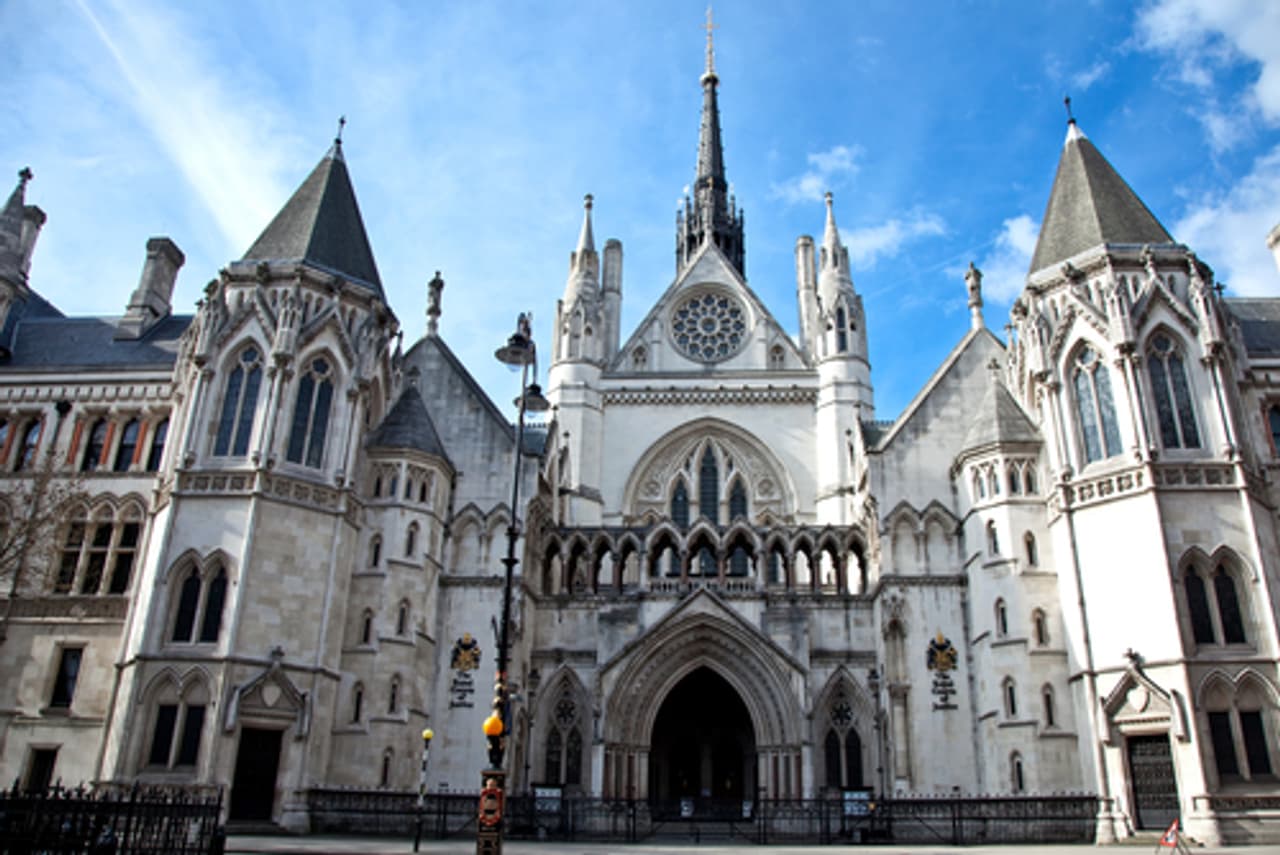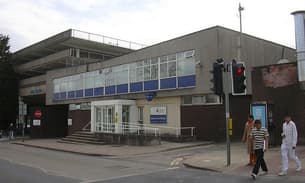
Prosecutor intervention behind dramatic falls in rape cases sent for charging
The Royal Courts of Justice. (Image: Shutterstock.com)
Over the last two years the number of rape cases referred by the police to the Crown Prosecution Service for charging has fallen by a third – despite a 3% rise in recorded offences over this period.
Research by the Bureau of Investigative Journalism reveals that tougher evidence standards and early intervention from prosecutors have contributed to this dramatic decline. The findings were described by the Shadow Attorney General Emily Thornberry, as ’cause for profound concern’.
The CPS told the Bureau that as part of a wider review it would now examine whether changes in evidence standards imposed by police and its own charging guidance had affected referral rates. It added that there is ‘currently no evidence’ of a link between the drop in referrals and its lawyers’ early involvement in rape cases.
Data obtained by the Bureau shows the decline in referrals has coincided with a fall in numbers of suspected rapists being charged.
In 2012/13 11% fewer suspected rapists were charged – 320 fewer than in the year before and the lowest level for five years.
The Bureau’s research found no single factor was behind the decline in the number of cases referred for charging. However eleven forces, all of whose rape referrals dropped by at least 21% last year, told the Bureau tougher evidence standards, considering cases more carefully before referral or talking to prosecutors about the strength of a case at an earlier stage contributed to the decrease.
The changes mean police officers are now making more decisions on whether or not to drop cases – decisions they would previously have asked the CPS, via a formal charging referral, to make.
One force that works closely with local prosecutors in rape cases said the arrangements meant the formal referral process for charging ‘was not necessary on all occasions’.
A marked drop in referrals
A document obtained by the Bureau shows that on average police forces across England and Wales sent 21% fewer cases to the CPS for charging in the financial year 2012/13 than the year before. But there is a significant variation in the level of this drop across the 42 forces in the data.
Half of all forces in England and Wales reduced their referrals by more than 21%. Six forces’ referrals dropped by 40% or more.
Data obtained by the Bureau also shows that in nearly three quarters of cases where the number of rape referrals by police forces have dropped, the number of charges made by the CPS has also dropped. When referrals have gone up, the number of charges has risen in all cases.
The Bureau contacted all the forces that registered a drop of more than the average 21% to find out how they could explain the dramatic fall.
Eleven said changes in the way they work with prosecutors and assess cases before referral had contributed to the decline.
The remaining ten forces said they had not changed their approach or were unwilling to respond.
Source: CPS/Home Office Roundtable briefing 26 September 2013
A spokeswoman for Cumbria Constabulary, where referrals have dropped by 54% in the last financial year, told the Bureau advice from prosecutors had led to a radical overhaul of its procedures.
‘Through ongoing conversations with CPS colleagues the Constabulary identified it was submitting some case files that did not meet the relevant Code for Crown Prosecutors evidential test’.
Under the ‘Full Code Test’, prosecutors must be satisfied that there is enough evidence for a realistic prospect of conviction. They then go on to consider whether prosecution is in the public interest.
Cumbria put new procedures in place ‘requiring decisions on prosecutions to be made within the Constabulary, with referrals to the CPS being made only for those cases where evidential and public interest tests stages of the Code were met and a prosecution was recommended, the spokeswoman said.
‘The result was therefore that referrals to [the] CPS declined’.
She added: ‘Where the detectives now make the decision to NFA [take no further action], the case files do not proceed to the CPS, as previously they would.’
Detective Chief Inspector Steve Chapman of Durham Police, which sent 39% fewer rape cases to the CPS in the last financial year, told the Bureau his force had agreed with the CPS that officers would be ‘more robust when quality assuring cases in the first instance, before deciding whether they should be referred to the CPS for a charging decision.’
He added: ‘This reduces delays, which is good news for victims and also relieves the CPS of an unnecessary burden.’
The country’s largest force, the Metropolitan Police Service referred nearly 300 fewer cases – a drop of 25% – to the CPS in 2012/13 than it did in 2011/12. Over two years referrals have dropped by 43%.
Numbers of rape cases charged by the Met dropped by 9% in the two years from 2010/11 though they did rise 3% in the last year.
A senior Met officer initially told the Bureau the force’s referrals had dropped as a result of a policy change put in place in response to the CPS director’s 2011 guidance on charging.
This guidance emphasised the police’s role in stopping all cases that do not meet evidence and public interest test standards before referring to the CPS for charging.
His statement, which was cleared by the Met’s press office, was retracted by the force after discussions with the CPS.
Forces in Gloucestershire, Norfolk, West Yorkshire and Essex all said they were sending fewer rape cases for charging decisions as a result of early liaison with the CPS.
Derbyshire Constabulary, Staffordshire Police and Thames Valley Police said they were now considering cases more carefully before approaching prosecutors.
Merseyside Police said the drop was mainly down to restructuring that artificially inflated case numbers in 2010. But he added that as prosecutors were working in the same office as police and advising officers on a ‘rolling basis’, the ‘piece of paperwork which would be needed to formally seek charging advice from the CPS centrally, was not necessary on all occasions.’
A spokeswoman for the CPS said: ‘We continue to work closely with the police through our Rape and Serious Sexual Assault Units units which are staffed by experienced specialist prosecutors to improve the evidential quality of files submitted in all cases, including those involving allegations of rape, to ensure the building of robust and effective cases for prosecution.’
There is ‘currently no evidence’ that this work is linked to the drop in referrals,’ she added, noting that the CPS is currently investigating the reasons behind the fall in rape referrals as well as similar declines in domestic violence and child abuse cases sent to prosecutors.
She said the evidential standard required for a prosecution had not changed, nor did the Director’s Guidance on Charging [See Box] impose new requirements on cases being referred for consideration.
‘Although this has not been raised as an issue before now, this work will include looking at the appropriate interpretation and application of the Director’s guidance and the evidential standard of the case files submitted to the CPS.
‘We have contacted a sample of police forces to investigate the variation in the change in volumes of rape referrals and a meeting to analyse the results of work will be held next month.’
Rape decision-making shifts to police
Prosecutors in many areas have struggled with backlogs of sexual offence charging decisions over the last two years, which may have artificially inflated case numbers in some forces as the backlogs began to be cleared.
A shift in responsibility towards the police could reduce CPS workload and improve charging decisions.
Data obtained by the Bureau under the Freedom of Information Act shows the fall in referrals for charging coincided with a 5% increase in the proportion of referred cases charged by the CPS.
However, while the proportion of referrals charged has gone up, the actual number of rape cases charged is at the lowest it has been in five years. In the last year alone 320 fewer charges were brought by the CPS than in the year before.
CPS figures for rape court prosecutions and convictions – which include suspects initially accused of rape but prosecuted for a different offence – also show a decline over the last two years.
Shadow Attorney General Emily Thornberry said she had uncovered the trend of falling referrals last summer and had been pressing ministers for an explanation since.
‘I haven’t got one,’ she said. ‘We were promised an inquiry. It never happened.’
She added: ‘It looks as though an explanation is now beginning to emerge, not from ministers but from police forces who are saying that changes have been made in how they work with the CPS. In some areas at least, it appears that the two agencies have agreed that the police should screen out more cases of rape and domestic violence, without referring them to specially trained prosecutors at the CPS.
‘If so this goes far beyond the modest changes in police charging powers that were announced two years ago and is a cause for profound concern.’
In 2010 Home Secretary Teresa May returned responsibility for charging decisions in a raft of low-level crimes to the police. Complex and serious offences such as rape remained with the CPS.
Long-standing concerns
The CPS’ rape protocol recommends the early involvement of prosecutors in rape cases.
The protocol was put in place following a CPS inspectorate report of 2007, which said some police forces were sending too many cases to prosecutors where evidence was insufficient to make a conviction in court likely.
New guidance on charging was issued by the director of the CPS in 2011 which more strongly emphasised the police’s role in ensuring weak cases – in all offences, not just rape – were not sent on.
In January 2012, Alison Saunders, the then chief crown prosecutor for London – who is now the Director of Public Prosecutions – gave a speech in which she said the guidance and ‘better gate-keeping’ had contributed to an improvement in the percentage of referred rape cases that were charged and prosecuted by the CPS.
‘The trend has been more cases proceeding to prosecution than not,’ she said, referring to a period between August and November 2011, by which time the guidance had been fully implemented. ”This is attributable to better gate-keeping, closer liaison with police colleagues in order to build as strong a case as possible and proper application of Director’s Guidance before cases are referred,’ she added.
It later emerged that actual numbers of cases prosecuted dropped during 2011/12, as they did the following year.
A version of this story was published in the Independent newspaper.
In 2007 a CPS Inspectorate report on rape, Without Consent, found some police forces were failing to identify cases where the evidence would not meet the requirement of a court. ‘This resulted in prosecutors being asked to make decisions that should have been made by police officers, with the responsibility for decision making in rape cases shifting solely to the CPS,’ it said. The report also found evidence that some officers were asking prosecutors for advice early on in the investigation about whether no further action was required, rather than using the process as it was intended – for seeking guidance on how best to build a case. As a result of the Without Consent report, a CPS-police protocol was put in place for adoption by local forces and prosecutors. The protocol said police should refer cases to the CPS early on, even when evidential tests had not been met, and that prosecutors would help in ‘bringing to an early conclusion those cases that cannot be strengthened by further evidence.’ The CPS issued the fresh charging guidance in 2011 , which emphasised the police’s role in stopping all cases that do not meet evidential tests before referring to the CPS for charging. ‘Police decision makers have an important role in identifying and stopping cases where the Full Code Test [a test set out in the Code for Crown Prosecutors that includes an evidence test and public interest test] cannot be met,’ it said. ‘The police should take decisions to no further action cases before referral unless the decision requires the assessment of complex evidence or legal issues.’
Changing policy
How the police forces explained the drop in referrals of rape cases Last year referrals of rape cases by the police to the CPS dropped on average by 21%. But a document obtained by the Bureau shows there is significant variation across 42 force areas in England and Wales. The figures show half the forces report a drop in referrals above the average. The Bureau asked each of these 21 forces how they could explain the large drop. Their answers are below. A spokeswoman for Cumbria Constabulary, where referrals have dropped by 54% in the last financial year, told the Bureau advice from prosecutors had led to a radical overhaul of its procedures. Through ongoing conversations with CPS colleagues the Constabulary identified it was submitting some case files that did not meet the relevant Code for Crown Prosecutors evidential test, resulting in the Crown Prosecution Service making “no further action” decisions. It was identified that this was unnecessary and therefore a more efficient, less bureaucratic and expeditious process was developed. A training programme was developed for Detective Sergeants and Detective Inspectors and the process implemented requiring decisions on prosecution to be made within the Constabulary, with referrals to CPS being made only for those cases where the evidential and public interest stages of the code were met, and a prosecution was recommended. The result was therefore that referrals to CPS declined, as the decisions previously being made by CPS were now made by relevantly trained and qualified ranking detectives, and by doing so, the efficiencies and reduction in bureaucracy were also realised. The case files are not necessarily “more carefully” scrutinised, but there is an additional decision making point in the process, which has now resulted in Detective Sergeants and Inspectors making the decision to No Further Action or prosecute. Where the detectives now make the decision to NFA, the case files do not proceed to the CPS, as previously they would. Detective Chief Inspector Steve Chapman of Durham Police, which sent 39% fewer rape cases to the CPS in the last financial year said: ‘The way Durham Constabulary investigates rapes and other serious sexual offences has not changed. However, we have a close working relationship with the CPS in our region and we hold regular meetings and carry out joint audits to identify any areas where we think there is scope for improvement. As part of that continual process it was agreed the police would be more robust when quality assuring cases in the first instance, before deciding whether they should be referred to the CPS for a charging decision. This reduces delays, which is good news for victims and also relieves the CPS of an unnecessary burden.’ A spokesman for Gloucestershire Police said: ‘What happens now is that there is far more interaction between officers and the CPS throughout the process, right from the start. Formerly there was little interaction up to the point of the case being referred.’ ‘This means that if there is an unrealistic prospect of conviction, we can bring the process to close before it goes any further. This helps protect the victim by not prolonging their ordeal and putting them through the court process.’ Norfolk Constabulary, whose referrals halved in the last year, said: ‘The reduction in the referral figures can be attributed to a combination of two factors. In 2012/13 Norfolk Constabulary strengthened its early consultation procedures with the CPS for rape cases. This resulted in enhanced liaison between prosecutors and police investigative teams at an early stage with their advice helping to progress rape investigations. Combined with a fall in overall reports of rape to police during 2012/13, this early consultation contributed to a reduction in the number of rape referrals for formal pre-charge decisions. The effectiveness of these early consultation procedures is illustrated by the increased detection rate for rape offences during the same period. Our current practice was introduced following the CPS setting up Rape and Serious Sexual Offence Units locally.’ Derbyshire Police said: ‘The reduction in referrals is linked to a change in procedures. Previously the force automatically referred every rape allegation where there was evidence or a suspect to the CPS for a decision about the possibility of prosecution. Now the force considers each case file before seeking CPS advice.’ Detective chief inspector Scott Cannon of Essex Police said: ‘In March 2012, Essex Police created a new Sexual Offences Investigation Team with dedicated and specially trained detectives. During the course of the last two years, officers have become highly skilled and adept in investigating cases of rape. Essex Police are also working more closely than ever with the Crown Prosecution Service and officers have a much clearer understanding around the evidential threshold which is necessary before a case is presented to the CPS for consideration. In addition, there has been a significant increase in the number of victims who have found the strength to come forward and report being raped or seriously sexually assaulted, many of whom just want to be believed and do not support any kind of prosecution. It is widely accepted that such a large increase in reported sexual crime is due to prolonged national media coverage in relation to a number of high profile celebrity cases. The CPS protocol makes it clear that a prosecution will not take place against a victim’s wishes and Essex Police fully endorses this approach. Therefore, some cases will not ordinarily be referred to the CPS although all victims are provided with other support mechanisms.’ A spokesman for Merseyside Police said: ‘he reason for our decrease in the number of referrals made to the CPS for charging decisions on rape between 2010 and now is due to a large number of cases that the [specialist CPS/police] Unity team took on from all other investigative branches in the force when Unity were set up in 2010. Pre-Unity team, rapes would be investigated by individual CID branches in different parts of the force area. Cases that were already underway when Unity was formed were taken on by Unity as it was felt that it was a good opportunity for the rape lawyers who work in Unity to review the cases and establish consistency going forwards. At this time there was quite a backlog of cases awaiting CPS charging advice and Unity took that backlog on. This led to a greater number of cases being counted in the year 2010 then years after that when the figures level out. Additionally … the presence of CPS lawyers in the Unity team led to them being able to give ongoing advice to officers as to whether a charge could be brought. In terms of police policy to refer cases to the CPS or not, the detective chief super who has been looking at all this firmly believes that detectives within the Unity team are correctly making referals to the CPS where they believe there is a prospect of a conviction. There has not been a change in police policy and it has always been the case that experienced detectives in a unit (any unit, not just a rape investigation team) will review ongoing cases to see what should be done next with a view to putting forward a suitable case file to the CPS for charge decisions.’ Thames Valley Police, the country’s largest non-metropolitan police force, said: ‘Ultimately all cases referred to the Crown Prosecution Service (CPS) need to meet a strict evidential bench mark in order for a case to be viable to take before the courts. The decline in referrals made to the CPS has to be balanced against a significant rise in reports, of which a majority were historical reports generated by the increased public confidence off the back of Operation Yewtree and other high profile sexual offence investigations. While these offences are clearly recorded, they occasionally do not meet the necessary evidential criteria to refer these offences onto the CPS. We have also introduced specialist officers – Evidential Review Officers – to independently review cases to negate evidentially lacking crimes being referred to the CPS.’ The country’s largest force, the Metropolitan Police Service – which is responsible for 16% of all rape referrals to the CPS – referred 637 fewer cases – a drop of 43% – to the CPS in 2012/13 than it did in 2010/11. A Metropolitan Police Officer provided a statement which was retracted by the press office after discussions with the CPS. ‘Whereas previously the MPS was required to submit all rape investigations to the CPS for either a charging decision or an authority to take no further action; current guidance now requires the senior investigating officer to review the investigation and only submit to the CPS those cases where it is believed the evidence would reach the full code test [an evidential test],’ he said. ‘Where this is not the case that officer can authorise that no further action be taken. ‘ As a result of this change, the number of cases submitted to the CPS has reduced, but the percentage of those cases that were charged had increased, he added. The Met said the statement provided was inaccurate but a promised revised statement has not materialised. Asked whether it had changed its policy on rape case referrals and if so, when this had occurred, a spokeswoman said: ‘The MPS started applying our interpretation of version 4 of the Directors Guidance in late 2011 – early 2012.’ A former charity worker who assisted rape victims in London told the Bureau she had noticed in early 2011 that more cases were being dropped by the Met which would previously have been referred. ‘Officers later told me they would only NFA [take no further action on cases] if there was a piece of evidence undermining the victim, rather than just no supporting evidence.’ As time went on, she added, she came across cases which had been dropped by officers on a number of different grounds. Staffordshire Police said: ‘e number of rapes cases referred to the CPS in Staffordshire is decreasing but the quality of case files being sent to the CPS has significantly improved. A few years ago it was policy to send all cases to the CPS however, following a review we did with them, we found this wasn’t serving the needs of victims so supervisors now carefully review cases – prior to submission – to ensure they meet the CPS evidence threshold. West Yorkshire Police said: ‘It is suggested that the reduction of rape referrals is down to partnership work between the CPS and West Yorkshire Police, which empowers police supervisors to be able to identify cases that may not reach the evidential threshold for a criminal trial ….while there has been a fall in referrals made to the CPS, the number of offenders charged with rape over the last five years has remained consistent.’ A spokesman for Warwickshire Police said: ‘The number of rapes in Warwickshire is very low with around 12 per month on average. With such small numbers of offences it only takes a few cases to be very difficult and the referral rate to CPS changes dramatically. 2012/13 was one such year with a lot of challenging cases. 2013/14 figures currently show an increase of around 60%.’ West Mercia Police cited the same reasoning as did Gwent Police. Some forces said they were unable or unwilling to account for the decline. Lincolnshire Police said the force was unable to account for the decline and suggested it may be ‘simply down to there not being the evidence. A spokeswoman added: ‘ It is fair to say we have had an increase in historic rape reports and that will be in part due to the publicity surrounding Operation Yewtree. These cases are considerably harder to investigate and are less likely to make it to the referral to CPS stage. We have had a specialist rape investigation team in Lincolnshire now since 2010 and all cases are properly assessed to see if they pass the threshold test before they go to CPS.’ Humberside Police: said ‘We will not be providing a force comment,’ while West Midlands Police said: ‘We are not in a position to respond as an individual force.’ Dyfed-Powys Police said: ‘We recognise that there has been a fall in Dyfed Powys Police referrals to the CPS and in line with research commissioned by Chief Officers, CPS and the Home Office we are in the process of conducting our own review. The DyfedPowys Police policy is to provide a victim focussed response to rape investigations and is committed to bringing offenders of sex crimes to justice.’ South Yorkshire Police said: ‘To our knowledge there has not been a change in guidance or policy. However, it would not be appropriate for us to speculate on the reasons why there has been a decline in referrals to the CPS, in case it undermines the progress of any national investigation into the reasons for this decline.’ Sussex Police said it had not changed its criteria for submitting cases to the CPS. ‘We continue to submit cases where we feel there is viable evidence for the CPS to consider,’ a spokesman said. Hampshire Police said it had not changed its policy on referrals: ‘During the specific period in question there was a reduction in the number of reported rapes to Hampshire Constabulary which may account for a correlated reduction in CPS referrals,’ a spokesman said. ‘Additional specific trends regarding the number of referrals made cannot be identified without reviewing circumstances on a case by case basis. Hampshire Constabulary welcomes national work to identify these trends and will also work to look into these issues itself.’
Because a lot of the advice was being given on a rolling basis and done in-house, a piece of paperwork which would be needed to formally seek charging advice from the CPS centrally, was not necessary on all occasions. ‘





